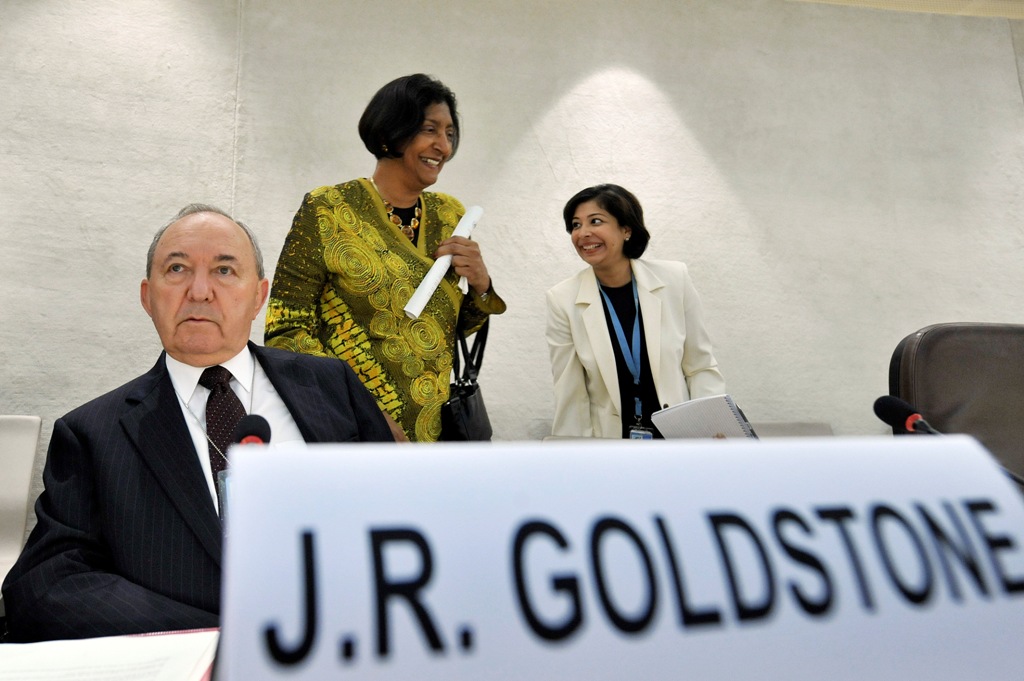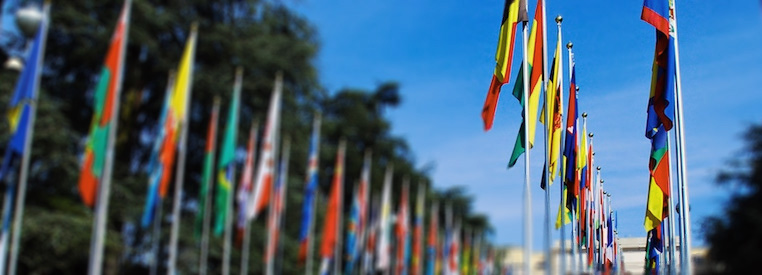Child soldiers: trial as deterrent?

Pierre Holtz, UNICEF CAR
Robert Marquand of the Christian Science Monitor poses a question on the Lubanga trial, still underway at The Hague since it opened nine months ago: “Is an army of child soldiers a war crime?” Read more
Guinea to probe rally shootings
From the BBC:
Guinea’s military government has announced it is setting up a commission to investigate the shooting of protesters in the capital last week.
Its members are to be drawn from political parties, unions and civic organisations as well as the military. Human rights groups say 157 people were killed in the incident, while the government puts the figure at only 57.
Opposition parties have rejected meditation talks until those behind the stadium killings face justice. [...]
More here.
Separately, The New York Times reported yesterday:
Cellphone snapshots, ugly and hard to refute, are circulating here and feeding rage: they show that women were the particular targets of the Guinean soldiers who suppressed a political demonstration at a stadium here last week, with victims and witnesses describing rapes, beatings and acts of intentional humiliation.
More here.
Posner says Goldstone report “flawed,” judge defends findings

UN Photo / Jean-Marc Ferre
The U.S. has urged its close ally Israel to conduct credible investigations into allegations of war crimes committed by the IDF in Gaza in December 2008 and January 2009, saying it would help advance the Middle East peace process, Reuters reports. Michael Posner, U.S. Assistant Secretary of State, surprised human rights advocates on 29 September when he said that Goldstone’s report was “deeply flawed,” without elaborating on details. Speaking before the U.N. Human Rights Council in Geneva, Posner said Washington disagreed with the report’s “methodology and many of its recommendations.” He added that the Council paid “grossly disproportionate attention” to Israel, but that the U.S. delegation stood ready to engage in a balanced debate. He encouraged Israel to “utilize domestic [judicial] review and meaningful accountability mechanisms to investigate and follow up on credible allegations.” “If undertaken properly and fairly, these reviews can serve as important confidence-building measures that will support the larger essential objective which is a shared quest for justice and lasting peace,” he said. More here. Goldstone defended his report (AP) that accused both Israel and Palestinian militants of war crimes during the Gaza conflict, rejecting the criticism by Israel that the report was politically motivated. “We believe deeply in the rule of law, humanitarian law, human rights and the principle that in armed conflict civilians should to the greatest extent possible be protected from harm,” he told the U.N. Human Rights Council before the intense day-long debate of the Human Rights Council. Read his full statement here and the subsequent press release on presentation of the report to the Human Rights Council. A transcript of the press conference is also available. Webcasts are also available at the UNHRC archive. Read the full Report of the United Nations Fact Finding Mission on the Gaza Conflict
Executive Summary (Advance 1)
Conclusions and Recommendations (Advance 2)
Law on state secrets
Attorney General Eric Holder Jr. has recently set out new guidelines on invoking the rule on state secrets in the future. A New York Times editorial welcomes this as “a positive step forward, on paper, but [it] did not go nearly far enough.”
One of the ways that the Bush administration tried to avoid accountability for its serious misconduct in the name of fighting terrorism was the misuse of an evidentiary rule called the state secrets privilege. The Obama administration has essentially embraced the Bush approach in existing cases, trying to toss out important lawsuits alleging kidnapping, torture and unlawful wiretapping without any evidence being presented. [...]
[...] Mr. Holder’s much-anticipated reform plan does not include any shift in the Obama administration’s demand for blanket secrecy in pending cases. Nor does it include support for legislation that would mandate thorough court review of state secrets claims made by the executive branch. [...] Hardly a panacea to ending state secrets abuses, the new regulations remain largely susceptible to subjective interpretation and enforcement, the editorial claims. The law’s success would also be contingent upon whether the Justice Department is able – or, rather, willing – to stand its ground, vis-a-vis intelligence agency demands. The editorial urges the Obama administration to support the State Secrets Protection Act sponsored in the Senate by Patrick Leahy, the Judiciary Committee chairman, and in the House by Representative Jerrold Nadler, a Democrat of New York: The need for such safeguards is not theoretical. Even as Mr. Holder tried to reassure Americans with new written rules, the Justice Department was seeking dismissal of a significant lawsuit over the Bush administration’s extraordinary renditions program based on a blanket claim of national security by Gen. Michael Hayden, the former director of the Central Intelligence Agency. More here. Richard Goldstone, head of the UN fact-finding mission on the Gaza conflict, writes today in The New York Times. Read more John Dugard, a South African professor of law, argues that accepting the Palestinians’ request to investigate Israeli actions in Gaza would help advance international justice. [...] Several factors favor an expansive approach. First, there is the fact that the Palestinian entity has been widely recognized as a state and meets most of the requirements of statehood — population, territory, government and ability to conduct international relations. [...] Second, the Palestinian National Authority has a judicial system more developed than that of many members of the I.C.C., which would allow it to comply with the cooperative obligations contained in the statute. Third, the purpose of the Rome Statute, as proclaimed in its preamble, is to punish those who commit international crimes and to prevent impunity. If an entity claiming to be a state, and recognized as such by a majority of states, makes a declaration under the I.C.C. statute that seeks to give effect to such goals, the I.C.C. should accept it as a state for the purpose of the I.C.C. statute. [...] Moreover, Dugard, who was also chairman of the Independent Fact Finding Committee established by the Arab League to investigate violations of humanitarian law during Israel’s military operation in Gaza in 2008, argues further that the political cost of not taking the case seems to outweigh the perceived challenges of moving forward with an ICC investigation. Launching an investigation would be an “opportunity to show that [the Court] is not infected by a double standard and that it is willing to take action against international crimes committed outside Africa,” he argues. More here. George Fletcher, a professor of international jurisprudence at Columbia University, presents an opposing view to the “expansive approach” put forth by Dugard, refuting ICC jurisdiction over the alleged crimes committed during “Operation Cast Lead” for both legal and political reasons: The legal reasons for the I.C.C. not to get involved are obvious. The statute requires a declaration by a “state” to accept jurisdiction. Neither Gaza nor the Palestinian National Authority is anywhere near the status of a state. But even if the prosecutor ignored this “technicality,” another deeper consideration should prevent him from inquiring further. Under the accepted reading of the Rome Statute, acceptance of the jurisdiction of the I.C.C. with respect to the “crime” implies an investigation of both sides and their contribution to the occurrence of criminal offenses. It would be impossible to investigate alleged Israeli crimes, such as shooting at civilian targets, without also investigating alleged Palestinian crimes, such as using civilians as human shields and firing rocket indiscriminately at civilian populations. No one knows how broadly the “crime” in question should be construed. It could conceivably extend in time to include the crime Palestinians have committed by using suicide bombers to kill innocent Israeli civilians on dozens of occasions in past years. [...] More here.Goldstone on “Justice in Gaza”
Two different views on Gaza justice
Welcome to the AAICJ Blog
 The AAICJ blog will feature relevant news, information, events, and articles of interest for its members. It will also act as a forum in which users can post comments and suggestions.
The AAICJ blog will feature relevant news, information, events, and articles of interest for its members. It will also act as a forum in which users can post comments and suggestions.
In the meantime, please feel free to peruse the site to learn more about us.
